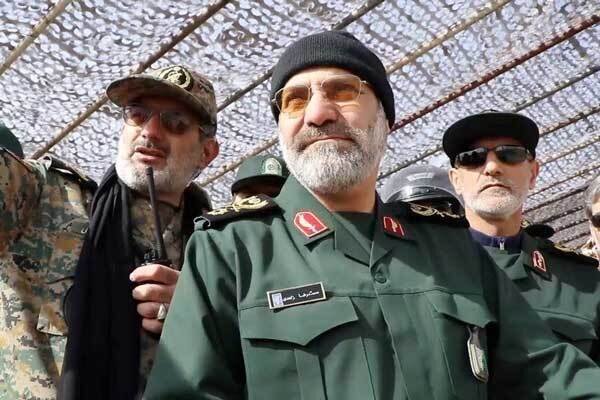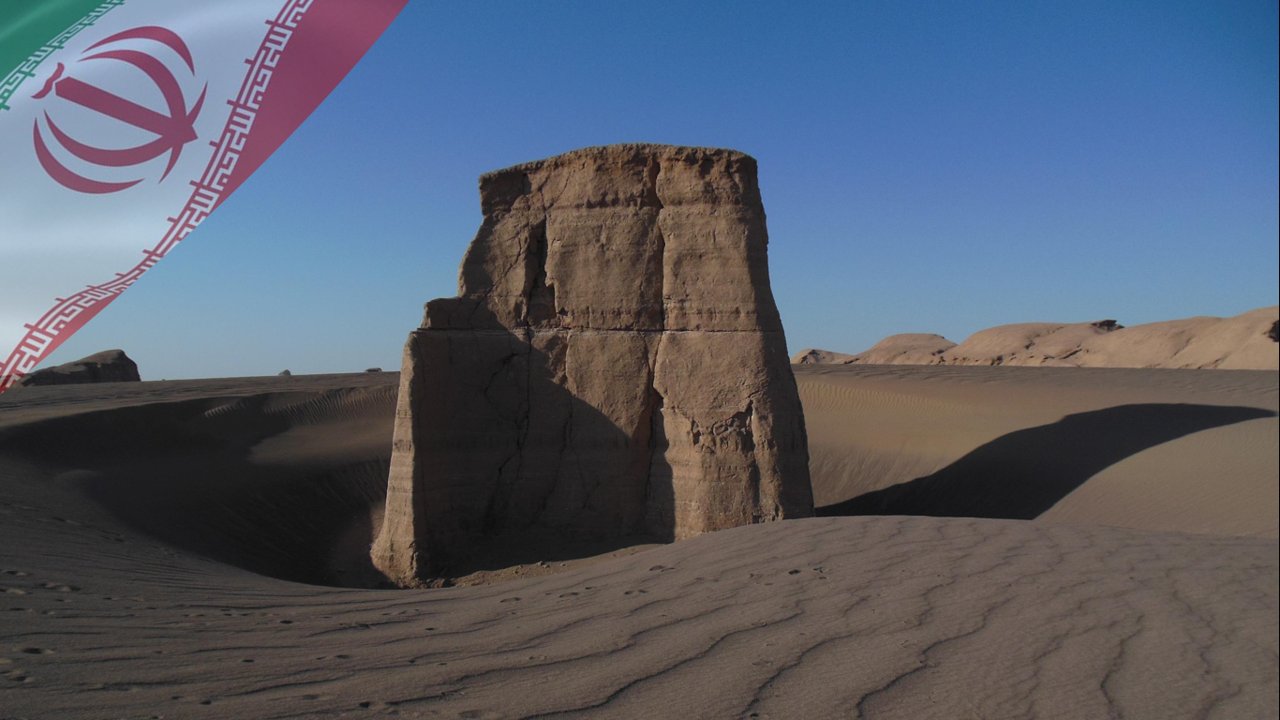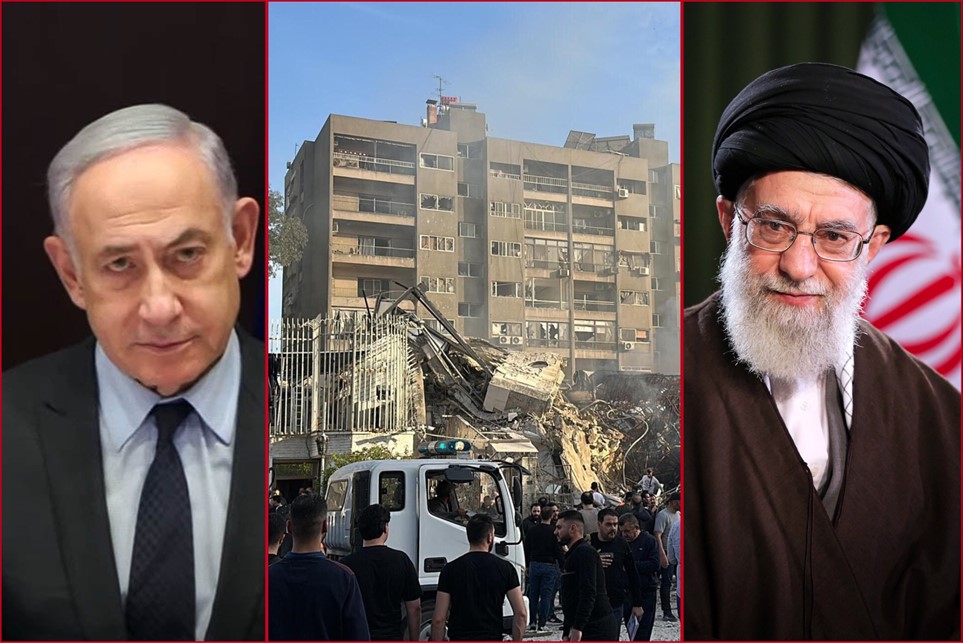On 1 April 2024, Tel Aviv launched an airstrike at the Iranian Embassy and Consulate in Damascus, killing eight Iranian military advisors serving in Syria and Lebanon, including senior Revolutionary Guards commander Brigadier General Moḥammad Reẓā Zāhedī. The strike completely demolished the Iranian consulate, damaged the embassy and many surrounding buildings, injured many members of the embassy and consulate staff, killed 4 Syrian civilians, and not the least, violated all norms of international law regarding diplomatic relations.
This is just the latest turn in the long proxy war between Tehran and Tel-Aviv, which has intensified severely since the Israeli genocidal war started in Gaza. Killing senior officials and military commanders, bombing each other’s semi-secret compounds in third countries, or launching direct operations against each other in third countries is not new between the two sides.
Bombing an official embassy and consulate, openly declared diplomatic missions in a third country, however, is not just something new. That is an outrageous and rare violation in the history of international norms, experts civil war-torn countries. Not to mention the fact that Israeli aggressions against Syria are constant with little regard for legality, so far hitting downtown Damascus residential areas has counted to be one of the very few unwritten taboos that haven’t been crossed. At least not so blatantly.
The aggression caused a very understandable outrage in the international forums and the U.N. with little effective result, while on the other hand, the international media leaning towards the Israeli position wasted no time justifying the rationale for this action. Even applauding it in a way for such managing to kill such high-level targets and sending a firm message.
In light of the very clear animosity between the two sides one might think that what happened is nothing new. Might even show Iran, and even Syria as weak and desperate not being able to defend themselves, or retaliate. But it should be not forgotten that the last time something similar happened, when the Americans assassinated General Qāsem Soleymānī in Baghdad Iran eventually responded by openly bombing an American military base in Iraq. So, is there something similar to be expected? Tel Aviv and Washington certainly presume so, as the Israeli side put its measures on high alert, while Washington sent indirect messages to dissuade Tehran from a direct strike.
Unprecedented diplomatic violation
Iran since the revolution in 1979 has an intriguing and disturbing history of violations of international norms, both on the casing and the receiving side. After all in 1979 Iran during the chaotic times of the revolution occupied the American embassy in Tehran and kept 52 hostages, including diplomats for 444 days in custody.
Later in 1988, it was Iran, that suffered an unprecedented humanitarian tragedy when the American warship U.S.S. Vincennes from within Iranian territorial waters shot down Iranian Air Flight 655, a passenger flight heading from Bandar Abbās to Dubai, killing 290 people, for which Washington never apologized.
In 1998 in Afghanistan the Iranian consulate in Mazar-i-Sharif was taken over by the Taliban forces, killing ten Iranian diplomats.
And in most recent history in January 2020, the Americans assassinated Iranian Revolutionary Guards Commander Qāsem Soleymānī in Baghdad in a diplomatic mission, under diplomatic immunity as an official guest of the Iraqi state. Once again, Washington did not apologize to Iran, nor to Iraq, whose military commanders also lost their lives.
Thus violating diplomatic immunity, or international norms has a dark legacy in the region, especially within the context of the constant proxy war between Tehran, Washington, and Tel Aviv. Therefore Tehran might be outraged, but it is very unlikely that the consulate was chosen as a safe house for a high-level military meeting, and much more likely it served as a more secluded, more controlled environment. And Iran with many states taking its side now can protest, but in light of the Israeli actions in Gaza breaching all norms with full American support, it is very unlikely it would yield any result.
Who was General Zāhedī?
Though Brigadier General Moḥammad Reẓā Zāhedī of the Iranian Revolutionary Guards elite Jerusalem Forces unit – a branch responsible for supporting Iran’s allied sides abroad with advisors, special forces, and arms – was probably not one of the most known figures of the Iranian military, he was not a grey figure either. He had a very extensive military background, especially in regard to Lebanon and Syria.

Zāhedī was a middle rank figure of the Revolutionary Guards after the war with Iraq ended, but soon enough climbed the ranks. And unlike many of his colleagues, kept a significant distance from the political limelight. By the ‘90s he was tasked helping Iran’s allies in Lebanon, most notably Ḥizb Allah, and had a significant role in the operation, which eventually forced the Israeli occupation to withdraw in 2000. He remained in this post later on helping Ḥizb Allah improve its capabilities, which bare fruits in 2006, when the Israeli aggression against Lebanon that year was defeated. In that role he belonged to a small inner high level circle, which coordinated operations between Iran and Ḥizb Allah and the Syrian support for it. All other members of this small circle have already died. In 2006 after the death of his predecessor he took over the command of the Revolutionary Guards land and air forces, but two years later returned to the Jerusalem Forces and given his immense experience he was charged once again with the support of Lebanon. During the war against a Syria since 2011 he remained in this position, though not on the field, but as a major coordinator.
Most Iranian sources claim that this task had ended around 2018, but with all likelihood since the war in Gaza he regained his formal duties. Whatever the case, he had huge experience in region and extensive personal connections, where he rarely returned personally.
Only few days before his death he arrived in Syria and remained in the Damascus on diplomatic grounds, supposedly granting him a high level of protection during his stay. Many Western sources hint that the number of Iranian military advisors, including another Brigadier General is a sign that high level coordination meeting was taking place at the time of the Israeli attack, which was aimed to plan the next phase of the operations supporting Palestine and Syria.
What gives ground to these suggestions is the fact that on 29 March, so only three days prior Tel Aviv had launched an series of strikes in Northern Syria, bombing several positions in Aleppo province, the city of Aleppo itself and killing 38 members of the Syria Army along with five members of Ḥizb Allah. That attack was already an unprecedentedly bloody aggression against the Syrian Army, which was openly and directly coordinated with the attack of the terrorist factions in the area. It also hit positions around Damascus, where the Iranian presence is strong. Given that it is fair to assume that the attack caused losses to the Iranians as well and the attack was on an unusually large scale, it is likely that Tehran had put some retaliation in motion the time the second attack came. And thus, the two events must be assessed under one umbrella.
The loss of Zāhedī is no doubt a painful one for the Irani operations, just like the regional deputies lost here, who were more directly involved in the ground operations. It is also likely that the operations they planned to assess in Damascus suffered some level of setback, at least in time. However, if someone believed that such a loss would intimidate, or break Iran, or would force it to some unwise rush action probably missed the history of Iranian tactics in the last three decades. The operations will continue, just as they did after the assassination of Qāsem Soleymānī, and looking at the scale of the direct Iranian operations in the region and those by its allies in Iraq, Syria and Lebanon against both the American and the Israeli positions, they are clearly developing.
Soon enough Tehran will find the proper replacements, learn from the security mistakes, take the lesson and will continue. However, it is less likely that the real respond would be swift. It might be an attack on some Israeli position in Iraqi Kurdistan, or some other place in the region is likely to save face, but launching a direct attack on the Israeli military it very unlikely. For one, both the Israelis and the Americans are on high alert now, so it is better to wait until their guard is down. But also, waiting for an action that is not coming is grueling. So, Tehran will take the proper time to plan something fitting.
But where is Syria?
An interesting aspect of the two Israeli attacks is the posing question, where is Syria in all this? Is the Syrian army really that weak not even being able to protect the capital? Does it have any support from either Russia, or Iran to prevent such direct attacks? Can it do nothing, when Tel Aviv openly launches attacks together with terrorist groups deep inside the country?
This latter is a different matter, however, it is interesting to note that while Syrian Foreign Minister Fayṣal al-Miqdād immediately visited the site and expressed his condolences, and Damascus heavily complained in the UN, the Syrian position was almost totally missing from Western accounts. That is partially by the perception that at this point Syria has little independence to maneuver on its own, and this the real question is how Iran will react. That is not correct, as Syria does have its own policy and will, regardless of its closeness to Moscow, or Tehran. But also because several Western sources hinted Iranian irritation by the probable Syrian security leaks that allowed Tel-Aviv to learn about the meeting and carry out the attack.
If we looked at the attack on 1 April alone this might have been the case, but about the attack three days earlier, when the Syrian Army suffered the biggest losses that is a very unlikely scenario.
The fact is that though it may seem that Tel-Aviv hits whatever it wants and whenever it wants within Syria with impunity, the Syrian defense is not helpless. It is lacking the needed support from its allies, on the scale the Israelis receive it from the US.
Syria might seem absent from the fighting around Gaza, either directly, or in Lebanon and in Iraq, it should be kept in mind that the Iranian operations in the region could not take place without massive support from the Syrian military. However, Damascus is on a very tight rope having areas under Turkish occupation, while in other areas the Americans openly trying to set up a Kurdish separatist statelet by the Iraqi formula. And that is topped by a devastating economic isolation.
Under these conditions Damascus does likely to keep pressuring its allies to step up their support, deliver more capable means for defense. And in light of the growing cohesion between Iran and Russia that is a fitting expectation. And while it is left alone to a large extent to deal with the consequences of these occupations, Damascus is very careful not to open more fronts than it can allow, and pose itself weak, incapable of posing a serious threat, though giving a green light to the operations of its allies. At least the opportune time comes.
Behind the scenes
The major question is, why did Tel Aviv launch such a blatant attack, knowing that it will only increase international pressure which is already huge because of Gaza? Undoubtedly the unconditional to American support action is a motivating factor, but still, it is a high price, if the aim was only to give Iran a message to back off. Such messages have been sent time and again and don’t seem to work.
The ever increasing scale of these attacks, and the growing number of terrorist attacks in Iran and the recents conflict with Pakistan indicate that Tel Aviv is worried. Something is forming behind the scenes in Syrian and Lebanon that is not clear yet, but surely the upper echelons of the Israeli leadership knows about and desperately try to defuse it.
One interesting point is the recent internal war of the so called Hay’at Taḥrīr aš-Šām in Syria, a local branch of the al-Qā’ida, which was once a useful tool in the hands of the states that fought against Syria since 2011, but by now fell back to the areas in Northern Syria, where the Turkish presence give them shelter. However, recently Türkiye started to crack down on such radical elements at home and started restructuring the armed groups under its wings in Syria as well. These groups are falling apart, which give way to many possibilities which way Ankara is heading with its project in Northern Syria. But it can indicate that it might start to dismantle them. And the attack on 29 March undoubtedly served by Tel Aviv as measure to boost their moral, to let them know that beyond the fight against Iran the Syrian state is not forgotten.
There has been similar indications in the Syrian East as well, where already twice in the last twelve months a tribal uprising gained ground against the American backed Kurdish separatists. And since then the attacks against the illegal American bases have increased in the area, not only from Iraq.
The motivation
The real reason for the Israeli attack against the Iranian consulate in Damascus, however, is tied to this sense to changing conditions all around and the will to balance the equation, but essentially emanating from Gaza.
The current war in Gaza has been not only the longest operation against the Palestinians, but the longest open war for the Israeli war machine ever. The military is in full motion, most reservists are already called in and can not really be released, especially now, and even though the casualty lists are hidden, there are more reports about massive casualties in Gaza. Without a full American support the Israeli military tuned to short burst total wars would have exhausted already. And that is topped with economic recession, growing political polarization both within the political class and within the society and hundreds of thousands of internal refugees still living in temporary quarters. And still, Netanyahu has achieved practically nothing.
Eventually the war in Gaza has to end in one way, or another. And at this stage it will be hardly satisfying to show that Gaza is totally demolished. That will not save the political life of Netanyahu, especially that after the war the stories of missteps in the war, the complains of the soldiers and accounting of how all that came to happen will pose a huge burden on his government. Already the smaller elements started desert the war cabinet, and the problems will be much bigger after the war is over. In case it is over.
Netanyahu has been a political gambler for long, who always jumped into any military quests, whenever he was losing internal support. So now, as the war on Gaza has already largely lost steam, he needs another, even larger quest. He has suggested many times that the next phase will be Lebanon, fighting against Ḥizb Allah. The reason he hasn’t started is not primarily due to the American objections. This does not forbid him doing it, but means that Tel Aviv would go there alone. Which would be an even bigger quagmire than Gaza.
The way forward for him is to provoke yet another war. Hoping that after the massacre in Kermān, killing its commanders in Syria and Lebanon and now blowing up its embassy Iran would respond in a fashion that can be posed in the international scene as aggression, regardless of the background. And when that happens, an open war can be started, which will be fought largely by the Americans. After which Netanyahu could say that it was hard, be he crushed Gaza, Lebanon and even Iran.
He has two problems, however. The first is that no matter how painful the provocation is, Tehran is not taking the bait. It does not give any justification for a direct American-Israeli aggression against it, moving ties carefully – and very effectively – in the background. The second is that the American presidential elections are coming. Until then Biden will not join such a risky and polarizing venture, when public opinion has already shifted against Tel Aviv.
Is retaliation coming?
In result two things will almost certainly will continue. The Israelis attacks in Syria in a growing scale, possibly targeting even more sensitive targets, and the Iranian moves operations undermining the Israeli occupation.
Mostly likely within a week, or two Tehran will launch a strike, or a clandestine operations against Israeli positions in Iraq, the Red Sea, in one of the African countries, or on the high seas. But that will be a limited move only to save face. The real response will come much later. Which will be more devastating.


